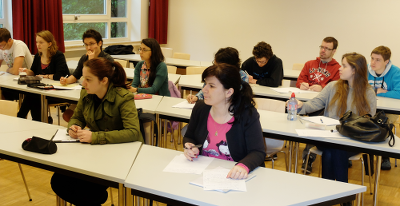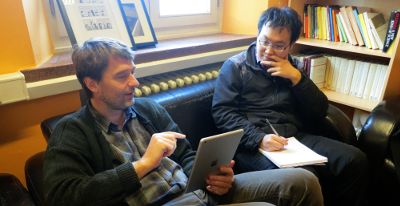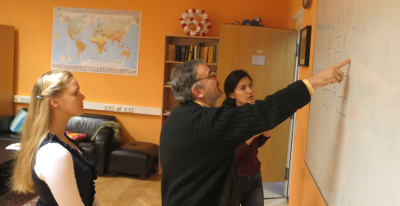Didactic Principles
- We teach pure mathematics in modern high level applied
contexts.
Examples: Clean discussion of Linear Algebra embedded into ubiquitous linearization techniques in applications; integral transforms and communications engineering; probability theory and finance; Hilbert space methods and finite elements in computational engineering. - “Top down” trumps “bottom up”!
Although much of the historical development of mathematics was driven by the desire to build theories bottom up from first principles, this is not a useful didactical concept, not does it reflect the way most research mathematicians work. - Learn by immersion:
It is important to learn by discussing mathematics on a formalized regular basis with an active mathematician. This is very analogous to study at a music conservatory. Lectures augment this, not vice versa. - Learn to interact:
Discuss with mathematicians and those who apply mathematics alike. Appreciate the complexity of mathematics in the real world, and understand that math is everywhere!
Jacobs University - small and focused
- Small classes:
Each year, about 20 students will be studying mathematics at Jacobs University. This allows for and one-on-one interaction with faculty, focused study, early research, and a holistic development of mathematical and personal skills. - Interdisciplinary spirit:
At Jacobs, there is a lot of mathematics and mathematical modeling across campus. Links are close and personal between faculty, students, and research staff in different fields that work together on common goals. - We care about each and everyone:
Students at Jacobs are are known personally to faculty. Individuals can and will get help to develop special interests, but also in time of special needs.
Overall goals
- Graduates who think clearly, formulate cleanly and present well.
- Graduates with the ability to figure out what is known, what is not known and what is the problem.
- Graduates who are confident in aquiring, understanding, und organizing information.

A session of Analysis II in Spring 2014.

Old and new technology.

Prof. Ivan Penkov is discussing with students in the Mathematics Lounge.

Students on the campus green.